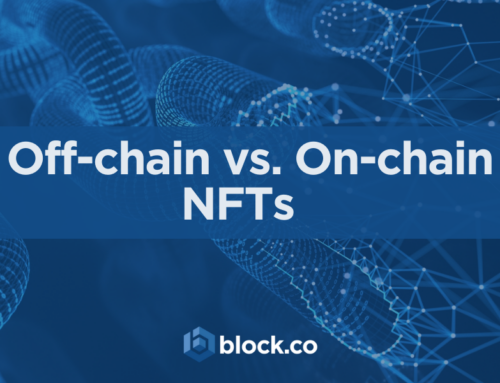Benefits of Blockchain Technology in the Banking Industry

The rapidly growing interest in blockchain is creating an increased amount of use cases across multiple industries, and a high demand for adoption by many governments. The banking, financial services, and insurance (BFSI) industries are predicted to be drastically transformed by this disruptive technology. According to Allied Market Research 2019, the blockchain value in the BFSI market reached $277.1 million in 2018 and is projected to reach $22.46 billion by 2026. Blockchain technology has the potential to solve the pain points of the current banking systems and operations including security, transparency, trust, privacy, programmability, and performance.
What is Blockchain?
Blockchain is the technology behind the Bitcoin cryptocurrency, which was proposed by Satoshi Nakamoto in 2008, as a response to the failing financial system during the crisis. It is often associated and confused with Bitcoin, but the scope of the technology is much wider. It is also important to differentiate between Distributed Ledger Technology (DLT) and blockchain, as the terms are often used interchangeably. All blockchains are DLT, but not all DLTs are blockchains. DLT is simply a decentralized database managed on a peer-to-peer basis.
In essence, blockchain is a continuous sequential chain of records (‘blocks’) that are chronologically linked together with the aid of cryptography, to ensure immutability. These records are immutable, as any change to the information recorded in a particular block is stored in a new block. Moreover, the use of modern encryption algorithms enables the security of all the records from copying or editing by other users of the system. Blockchain can be programmed to record not only financial transactions as a cryptocurrency but almost anything of value (Deloitte Insights, 2019).
How Blockchain Can Improve Banking Industry?
The modern banking system is not perfect and commercial banks have not changed a lot to their servicing structure since the 1970s (Haycock & Richmond, 2015). Running a bank still requires large numbers of the workforce, reliance on quite outdated systems, bloated structures with high probabilities of human error, and manual work. There are several aspects, which could be improved by the application of blockchain technology in banking operations:
1) Security Enhancement
In the UK the overall value of the financial fraud losses (e.g. payment cards, remote banking, cheques) equaled £844.8 million in 2018. The situation is even worse in the US — $170 billion average yearly losses in the financial sector. According to KPMG’s Global Banking Fraud Survey 2019 the total volume, number, and value of the fraudulent activities are drastically increasing every year.
The nature of banking operations dictates the need for centralized systems, which proved to be vulnerable and subject to cyber and hack attacks. Now, the blockchain is immutable as it operates on the principles of decentralization and transparency, and all the network participants get an identical copy of the distributed ledger of transactions. Thus, if applied in banking, blockchain can increase the validity and security of financial transactions, eliminate the need for third-party authentication, and solve the issue of a single point of failure and hacks.
Moreover, since each transaction on the blockchain has its unique fingerprint (hash) it can be easily traced and verified. Such functionality makes blockchain a great tool to combat money laundering and reduce fraudulent or illegal transactions (Guo & Liang, 2016).
2) Improving Financial Transactions Efficiency
As we mentioned previously, the utilization of obsolete mechanisms and operational systems slows down the performance of banking institutions and provides ground for human error, delays, and system failures. All these inefficiencies could be solved by applying blockchain technology. Take for example the time-consuming bilateral exchange. The process of data reconciliation needed for it could be simplified, as on the blockchain, it is inherently part of a transaction (IBM, 2016).
Blockchain and its decentralized nature eliminate intermediaries in banking operations, which significantly cuts transaction costs and boosts efficiency (Cocco et al., 2017). Blockchain does not require intermediaries, enables cross-border transfers and micro-payments, while drastically decreasing operational costs. Such transactions in the traditional banking environment are expensive (from 1% of the amount), and constitute a huge expense on a global scale. In cryptocurrency networks, transfers may range from a few minutes down to milliseconds, and the transaction fees are decided by the market forces, meaning users have the option to set their transaction fees (Deloitte, 2017).
3) Workflow Simplification
Blockchain can simplify the current complex workflow in banking institutions. As any operation can be traced, the ability to automate processes significantly reduces costs and the need for manual work. Moreover, it is impossible to make retroactive changes on the blockchain. This guarantees data immutability and excludes the human factor, thus the probability of error, data tampering, or even leakage. Using blockchain in banking operations will digitize and automate tons of manual work, greatly boost the productivity of the financial institutions and eliminate the probability of mistakes, delays, and errors.
4) Enhanced KYC & AML
Some financial institutions find it difficult to deal with problems related to policies such as Anti-Money Laundering (AML) and Know Your Customer (KYC). Numerous organizations are not able to solve these problems, due to the rapidly escalating costs. The adoption of blockchain technology will enable the creation of a system where all clients’ information may be stored safely, making the independent verification an easy process or even automated securely. In this way, both AML and KYC processes will become simpler and easier, as all involved organizations will share the same system and the information will be updated in real-time, perhaps through the use of Digital Identities. In addition to this, blockchain technology will assist organizations to minimize their administrative costs and reduce the workload.
5) Smart Contracts
Smart contracts are an innovative development of blockchain technology that enables for time and resources saving, as they do not require a third-party interaction. Traditional contracts do not differ a lot from smart contracts, however, their key benefit is that obligations are automatically enforced and cannot be avoided by anyone.
When smart contracts are integrated with blockchain technology, we enjoy benefits such as security, automation, immutability, and transparency. The integration of smart contracts in the financial sector will provide opportunities for transparent auditing and real-time remittances. Traditional contracts are paper-based and require financial institutions to invest money in paperwork and maintain records. These records can be easily manipulated as they are on paper. Smart contracts offer bank tools for bookkeeping based on blockchain. Smart contracts have already been applied to the financial industry to gain greater automation.
6) Decentralized Finance
Another application of blockchain is Decentralized Finance, also known as DeFi. This application is at an early stage but its disruptiveness enables millions of people across the world to have access to financial services. DeFi refers to decentralized applications, financial smart contracts, digital assets as well as protocols popular as DApps, which are built on public blockchains such as Ethereum and Bitcoin. The aim of DeFi is the creation of a decentralized financial system that will not depend on the traditional banking system.
Decentralized Finance offers numerous benefits to the users as it eliminates middlemen, enables everyone who does not have access to financial services to enter the global economy as it is a permission-less technology, and enables innovation with the combination of DeFi products. Besides, the use of decentralized finance increases the symmetry of information and democratizes financial services in this sense. The evolution of DeFi over the years means that most people around the world are only limited by their imagination when considering how to gain benefits from the financial ecosystem. However, there are still many complexities that need addressing to further expand the full extent of the possibilities of DeFi.
If your brand is ready to take the step into web 3.0 and NFT marketing, to optimize engagement with your audience in innovative ways, then click the button below to get your Free Trial, a limited number of Free NFTs, and a Free Consultation call from our team!
For more info, contact Block.co directly or email at enquiries@block.co.
Tel +357 70007828
Get the latest from Block.co, like and follow us on social media:







